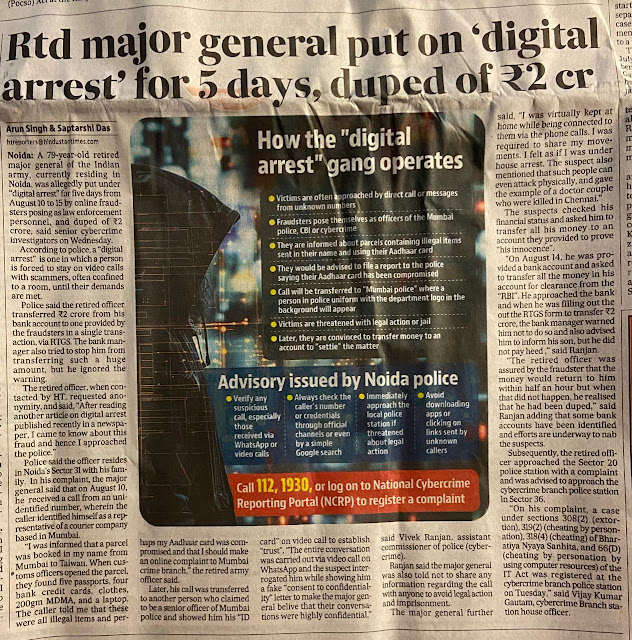Digital arrest means one has been trapped now by cyberthugs , and one can't get out w/o making a payment to them. They will ask you to keep your camera on so that they can see you but you cannot see them. They may initially send you their icard to establish trust. Conversation may start with a parcel received which has contraband goods.
A person is so much terrified that at times he locks in a room and stop listening to his near and dear ones.
They can threaten you with porn video or honeytrap or any secret which you donot want others to know. Best is to report to Police as police or CBI never digitally arrests you.
1st they lure you with giving big interest in small investments, then they make you do big investments in multi fund a/c.
Digital arrest refers to the use of technology to track, monitor, and apprehend individuals who have committed crimes or are suspected of doing so. This concept has gained significant attention in recent years due to advancements in digital technologies and the increasing reliance on online platforms.
In this article, we will explore the concept of digital arrest, its benefits, and its implications on society. We will also examine the various tools and techniques used in digital arrest and discuss the potential risks and challenges associated with this approach.
*Benefits of Digital Arrest*
Digital arrest offers several benefits, including:
1. *Enhanced efficiency*: Digital arrest enables law enforcement agencies to quickly track and apprehend suspects, reducing the time and resources required for traditional arrest methods.
2. *Improved accuracy*: Digital technologies, such as facial recognition and biometric analysis, can help ensure that the correct individual is apprehended.
3. *Increased safety*: Digital arrest can reduce the risk of physical harm to both law enforcement officers and suspects.
*Tools and Techniques Used in Digital Arrest*
Several tools and techniques are used in digital arrest, including:
1. *Facial recognition software*: This technology uses algorithms to match an individual's facial features with those in a database.
2. *Biometric analysis*: This involves the use of unique physical characteristics, such as fingerprints or DNA, to identify individuals.
3. *Social media monitoring*: Law enforcement agencies may monitor social media platforms to track suspects and gather evidence.
4. *Cell phone tracking*: This involves using cell phone data to track an individual's location and movements.
*Implications of Digital Arrest on Society*
Digital arrest raises several concerns and implications, including:
1. *Privacy concerns*: The use of digital technologies to track and monitor individuals raises concerns about privacy and surveillance.
2. *Bias and discrimination*: There is a risk that digital arrest technologies may be biased or discriminatory, leading to unfair outcomes.
3. *Dependence on technology*: Over-reliance on digital technologies may lead to a lack of traditional investigative skills.
Conclusion
Digital arrest is a rapidly evolving field that offers several benefits, including enhanced efficiency and improved accuracy. However, it also raises concerns about privacy, bias, and discrimination. As digital technologies continue to advance, it is essential to address these concerns and ensure that digital arrest is used in a responsible and ethical manner.















